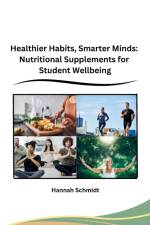av Hannah Schmidt
319,-
In today's fast-paced world, where students face immense pressure to excel academically, it is crucial to prioritize our overall wellbeing. As students, our physical and mental health play a significant role in our ability to perform well in our studies and achieve our goals. This subchapter aims to shed light on the importance of student wellbeing, particularly in relation to nutrition.Nutrition is a fundamental aspect of student wellbeing that often gets overlooked amidst the hectic schedules and demanding academic requirements. However, it is essential to understand that what we eat directly impacts our energy levels, concentration, and overall cognitive function. By adopting healthier eating habits, we can optimize our potential and enhance our academic performance.A well-balanced diet rich in essential nutrients, vitamins, and minerals is crucial for a student's overall health. It provides the necessary fuel for the brain to function optimally, improving memory, focus, and cognitive abilities. Incorporating nutrient-dense foods such as fruits, vegetables, whole grains, and lean proteins into our diet ensures that our bodies receive the nourishment they need to thrive.Moreover, nutritional supplements can also play a significant role in enhancing student wellbeing. These supplements, including vitamins, omega-3 fatty acids, and herbal extracts, can help bridge nutritional gaps and support various aspects of our health. They can boost our immune system, improve our mood, and reduce stress, ultimately helping us navigate the challenges of student life more effectively.However, it is important to remember that supplements should never be a substitute for a balanced diet. They should be used as a complement to healthy eating habits, providing additional support when needed. It is always advisable to consult with a healthcare professional or a nutritionist before incorporating any supplements into our routine.



